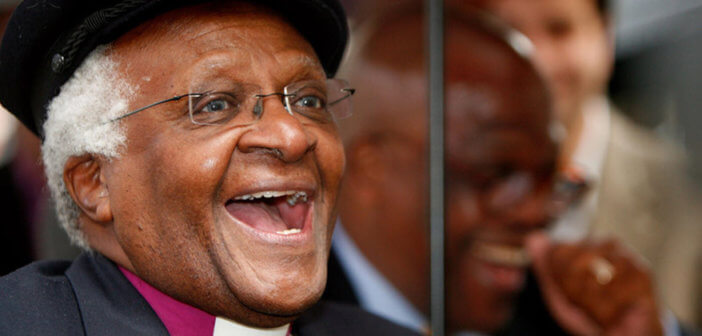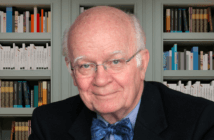Lewis Center Director Doug Powe learned through firsthand experience working with Desmond Tutu the key principles of the archbishop’s leadership effectiveness. Powe says Archbishop Tutu was fully present to whomever he was with. He regarded even opponents as children of God. And he remained persistent in the face of problems, large and small.
I was fortunate to have served as Archbishop Desmond Tutu’s teaching assistant while he was in residence at Emory University. It was a once-in-a-lifetime experience that allowed me to glean helpful leadership insights from Archbishop Tutu that relate to all our callings. Let me share a few of those insights.
1. Presence
In many cases the most important gift we can offer others is our presence — not just our physical presence but being fully attentive to the person we are with. I still marvel today that when the archbishop first met someone and talked with them no longer than a minute, that person felt they had spent an eternity with him. The archbishop was attentive to the person in front of him and made that individual his sole focus, even if just for a few moments.
In contrast, I am always doing several things at the same time, and I suspect most others are as well. When I’m talking to someone, I’m trying to respond to an important email at the same time. I’m listening to the person in front of me, but I am not completely attentive to that individual.
The practice of really paying attention to others makes a difference. It helps others feel that we are fully invested in what is at stake when discussing challenging topics. As leaders we can relate to others more effectively by foregoing our tendency to multitask.
2. Personhood
The archbishop reminded me of a truth often expressed by the elders in the church. We are all children of God. This statement sounds simple but has profound implications. If I truly believe you are a child of God, then I must treat you as such. I cannot demean, vilify, or seek to embarrass you. I observed the archbishop continually extend grace and treat others like children of God no matter how they approached him.
Many of us tend to be defensive or get angry when others are short or snippy with us. Treating them like children of God is the furthest thing from our minds. But think about the difference it can make if we take seriously the belief that everyone is a child of God. In many cases, it would change the way we talk to others and what we say about them, as well.
When others see us as people of integrity and are respectful of our personhood, they are much more willing to be in relationship with us. They are much more willing to be accountable to us because they trust out intentions are genuine. Treating everyone like a child of God is a spiritual discipline we all need to practice.
3. Persistence
Archbishop Tutu taught and preached persistence. When the odds are not in our favor and our backs are truly against the wall, we cannot simply give up. This is clearly evident in the archbishop’s struggle against apartheid, but he applied it to everyday challenges, as well. Whatever the challenges we face, we need to be persistent.
Persistence doesn’t mean repeatedly banging our heads against the wall. We cannot simply repeat the same thing over and over again. We must be willing to experiment with new and creative approaches that may yield different results. Persistence requires that we not give up when we’re stuck in the middle of the tunnel and cannot see the light. Persistence requires resiliency; unless one is able to recover or rebound, it’s hard to keep moving forward toward something new.
Archbishop Desmond Tutu teaches us that we can become more effective leaders by practicing presence, personhood, and persistence. I am thankful to have gained these insights from one of the most renowned leaders of our times.
Related Resources
- Nelson Mandela — A Leader for His Time by Lovett H. Weems, Jr.
- Dreams Take Leadership…and Time by Lovett H. Weems, Jr.
- Leadership Lived: Clementa Pinckney and Open Doors by Lovett H. Weems, Jr.






